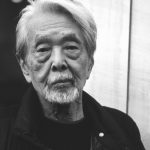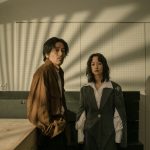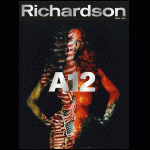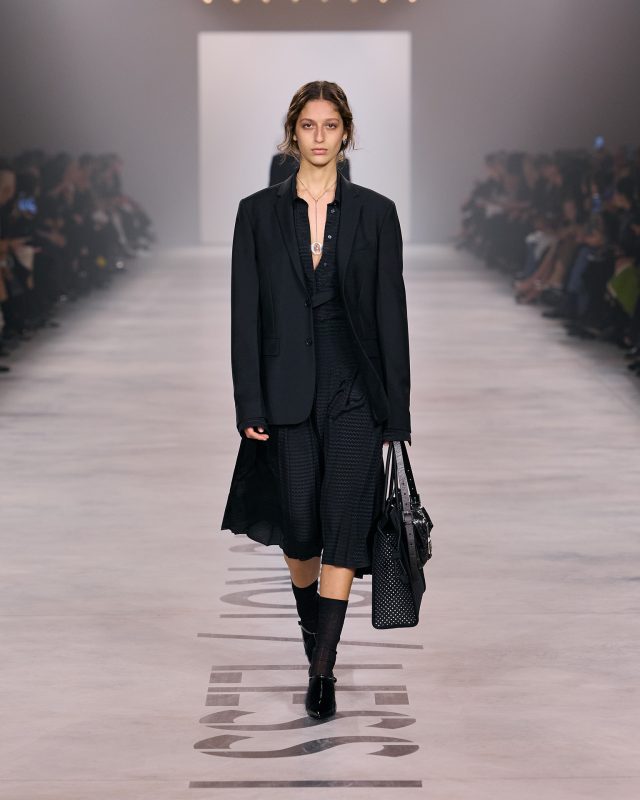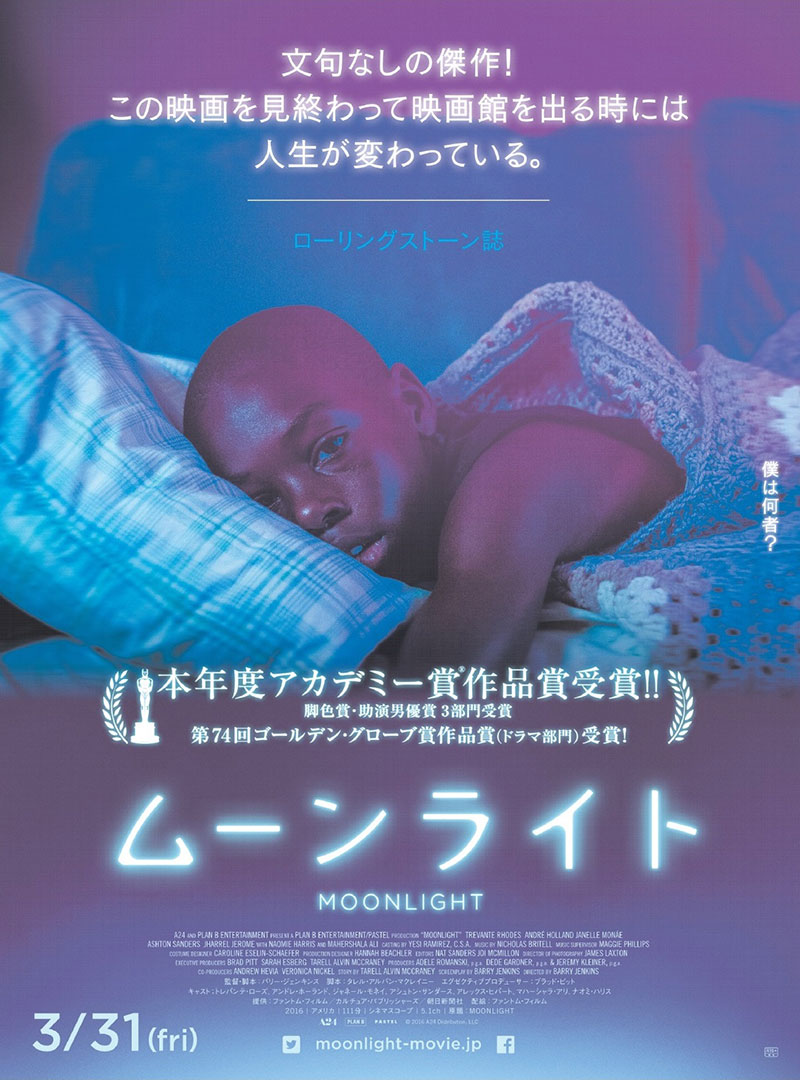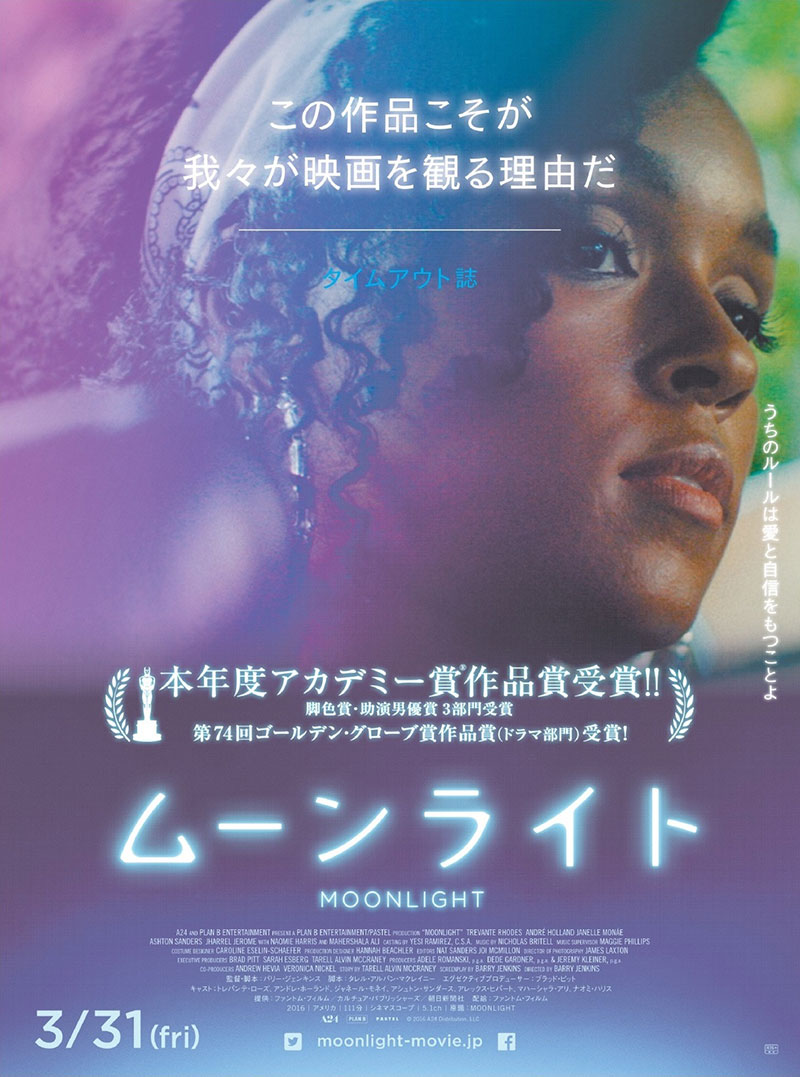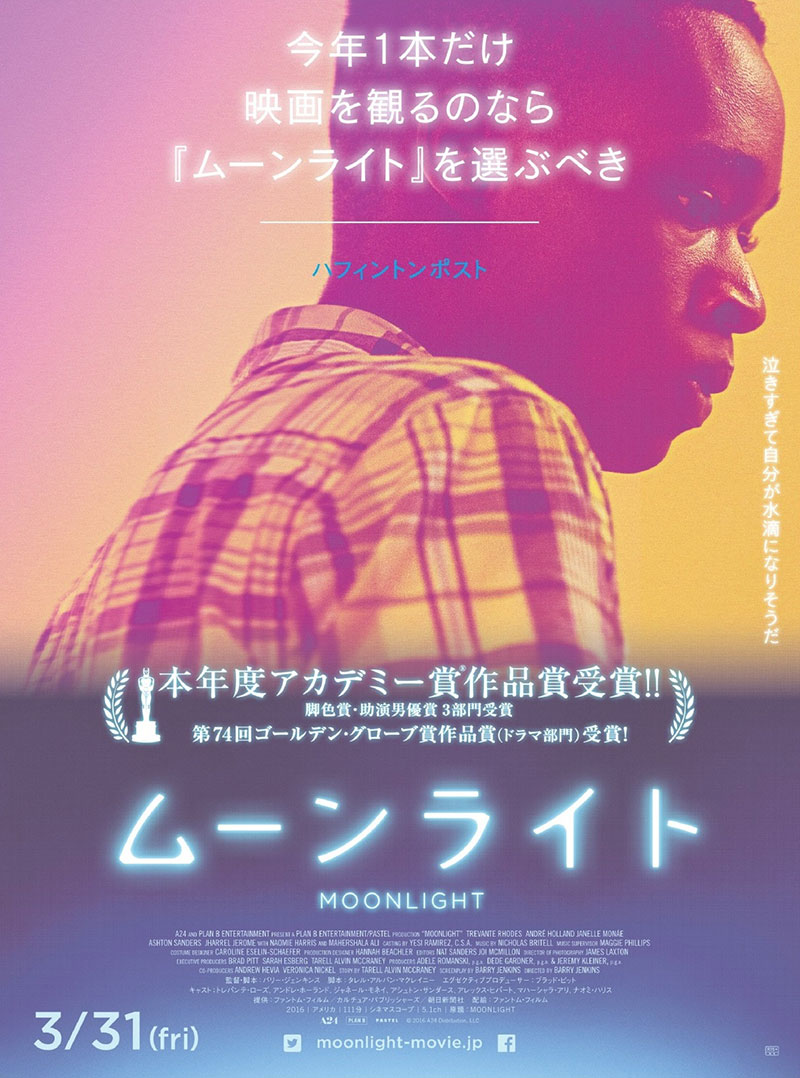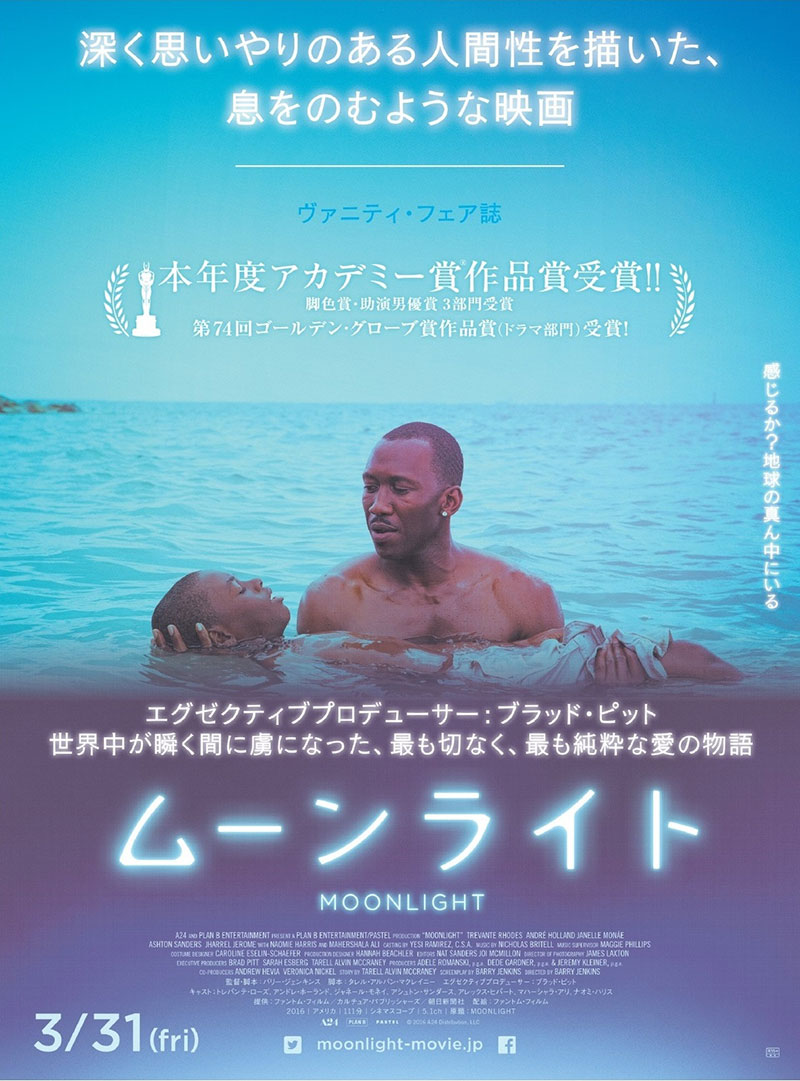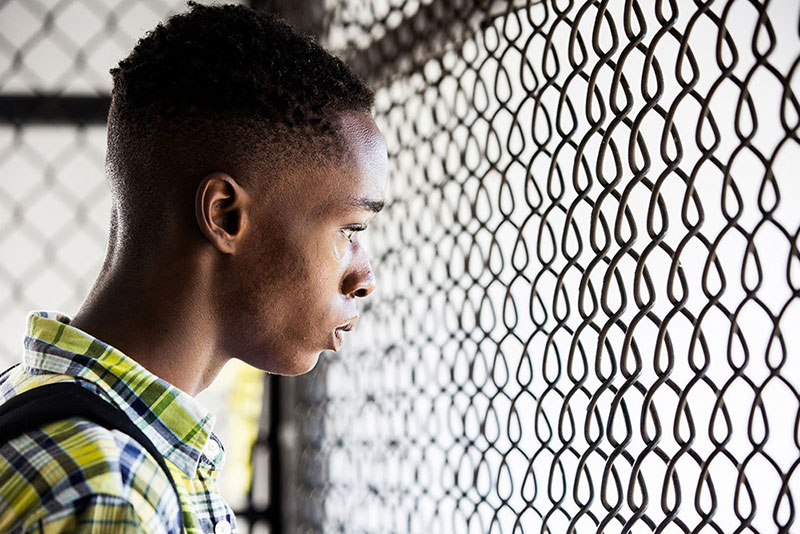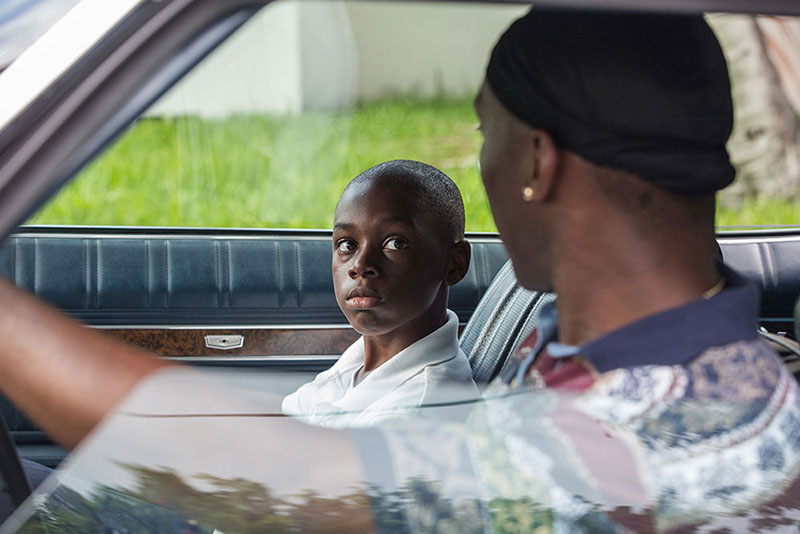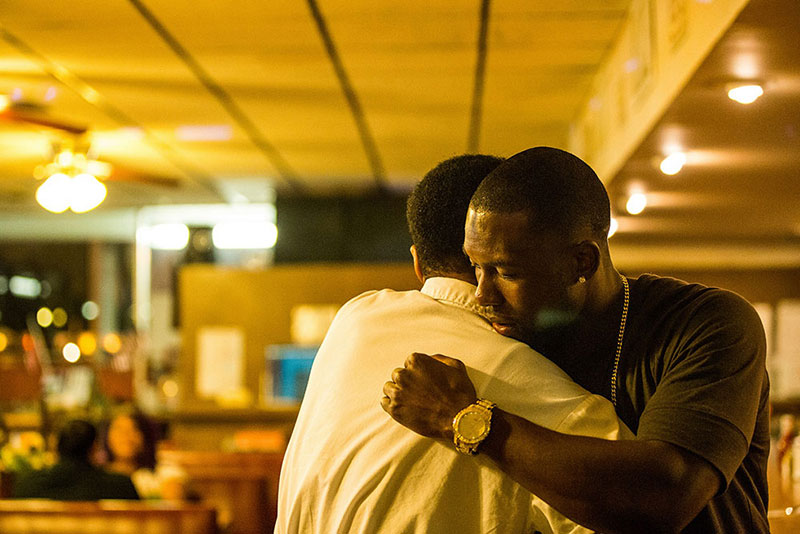映画監督・Barry Jenkins (バリー・ジェンキンス) インタビュー
Barry Jenkins
本年度アカデミー賞の作品賞に輝いた話題作『ムーンライト』。本作が長編二作目という新鋭監督 Barry Jenkins (バリー・ジェンキンス)が原作『In Moonlight Black Boys Look Blue (月の光の下で、美しいブルーに輝く)』との出会いやキャスティングの経緯、そして、自身とシャロンとの関係性について語った。
映画監督・Barry Jenkins (バリー・ジェンキンス) インタビュー
Film
*You’ll find the English text after the Japanese.

© 2016 A24 Distribution, LLC
本年度アカデミー賞の作品賞に輝いた話題作『ムーンライト』(2016) が日本でもついに公開した。自分の居場所を探し求める主人公の姿を、色彩豊かで革新的な映像美と情緒的な音楽と共に3つの時代で綴った本作は、第74回ゴールデン・グローブ賞では作品賞を受賞 、そして第89回アカデミー賞では作品賞・脚色賞・助演男優賞の3部門を受賞した。LGBTQ をテーマにしたラブストーリーが作品賞を受賞したのはアカデミー賞史上初のことであり、まさに歴史に残る快挙となった。監督は本作が長編二作目という弱冠36歳の Barry Jenkins (バリー・ジェンキンス)。
2017年『TIME』誌が選ぶ”世界で最も影響力のある100人”にも選出されるほか、『The New York Times』の世界の映画界で”見るべき20人の監督”の1人にも選出されるなど、その若き才能に世界中が注目している。Barry Jenkins はフロリダ州立大学で映画を専攻し、自主制作の長編映画『Medicine for Melancholy』(2008) でデビューを果たした。作品は批評家の間で好評となったものの、二作目となる本作が完成するまでに8年の年月がかかっている。大工の仕事をしながら、広告会社を設立して CM 制作を手がけたり、HBO の番組『LEFTOVERS/残された世界』に脚本家として参加するなど様々な活動を経て出会ったのがこの『ムーンライト』だった。
そんな Barry Jenkins が原作『In Moonlight Black Boys Look Blue (月の光の下で、美しいブルーに輝く)』との出会いやキャスティングの経緯、そして、自身とシャロンとの関係性について語った。
—この映画の原作に出会ったいきさつについてきかせてください。
この原作はもともと、Tarell Alvin McCraney (タレル・アルバン・マクレイニー)が戯曲として書き始めたものです。当時は知らなかったのですが、Tarell Alvin McCraney も僕もボルシチ映画祭に参加していました。最初 Tarell Alvin McCraney はこの戯曲を Andrew Hevia (アンドリュー・ヘビア) と Lucas Leva (ルーカス・レイヴァ) に託していて、彼らから僕の元へ「馴染の世界かも」って言われて渡されたんです。読んでみて彼らの言ってる意味がわかりました。Tarell Alvin McCraney と僕の生い立ちはとても似通っていて、住んでいた地区も学校も同じでした。さらに、2人とも母親がドラッグ中毒だったのです。映画では Naomie Harris (ナオミ・ハリス) が演じています。
—3部を通して演じているのは Naomie Harris [ポーラ役] だけですが、彼女と一緒にキャラクターを発展させていったのでしょうか?
役柄の詳細は脚本に書き込んでいきました。でも映画全体の要のようなものが必要だったので、他の役柄は部ごとで変えましたがポーラ (Naomie Harris) には3部とも出てもらいました。彼女は物語の“芯”のような存在でした。科学実験のように3部を通じて見守れる、それがポーラの役なんです。Naomie Harris は最初この役に抵抗があるようでした。なぜなら、ポーラはすごい闇を抱えた人物だったので、演じることで自身に負のイメージを作りたくなかったみたいです。なのでキャスティングした後、崩壊する親子との関係とか、僕自身の母親との関係を彼女と話し合いました。その結果彼女は誠実に取り組んでくれて、依存症になる人間の感情移入できる部分を見つけてくれました。彼女は依存症の人間を演じるのではなくその過程を演じようと考えたんです。ポイントを掴んだ彼女は Tarell Alvin McCraney や僕が育った時代の薬物依存の実態のリサーチを始めました。そこに彼女は真剣に取り組んだんです。

© 2016 A24 Distribution, LLC
—シャロンのキャスティングですが、役にふさわしいと思う個性を持った人たちを選んだのですか?
3部とも同じ俳優で撮ろうとは思っていませんでした。それは無理だと思っていましたから。環境のプレッシャーに負けてしまった時や、期待の重圧に負けてしまった時に人がどのように大幅に変わるのかを描きたかったのです。そこで、まず同じ感性を持った3人の俳優を探しました。決して外見が似ている俳優である必要性はありませんでした。Walter Murch (ウォルター・マーチ) 著の『映画の瞬き』という本の中に心の窓である目について書かれているのですが、感性というのは目を見れば分かるものです。目を通して似通った魂を持つ3人を見つけられれば、外見だけが似ているよりも醸し出す雰囲気で同一人物だと伝わると思いました。
この考え方で まず最初に Ashton Sanders (アッシュトン・サンダース) [10代のシャロン役] が決まりました。彼が役に最初に決まった時はケヴィン役との相性を探ろうとして何度も会いました。しかし、すぐに必要ない、キャスティングの際に相性を探るのは無意味だと気づきました。そこで同じ魂を持つケヴィン、同じ魂を持つシャロンを探すようにしました。ところが、 Trevante Rhodes (トレヴァンテ・ローズ) [シャロン役・ブラック] が現れて事情は大きく変わりました。彼はケヴィン役のオーディションを受けに来たのですが、僕はすでにケヴィン役は Andre Holland (アンドレ・ホランド) [大人になったケヴィン役] に決めていました。2人ともオーディションの役ではピンと来なかったのです。 はじめTrevante Rhodes は筋骨隆々のイメージで、とてつもなくマッチョに見えました。しかしそれでいて目には繊細さが宿っていたんです。彼のおかげで 僕が抱いていたブラック役の外見が変わりました。彼と会った途端に役の肉体的なイメージが一新されました。それでも、目には前の2部の2人と同じものをたたえていたのです。Trevante Rhodes との出会いから自分の信念にもとづいてより貪欲にキャスティングすることができました。
—昨夜 話されていたことでとても驚いたのですが 、3人ともお互いに会うのはトロントが初めてのようでしたが…
彼らが演じるのは同じ役なんですが、部ごとに雰囲気が変わっていきます。だから僕らもそれぞれ違う俳優を選びました。彼らの間で演技をまねたり、お互いに相談し合ったりして予定調和の演技をしてほしくなかったんです。僕にとって今の世の中はお仕着せの世界です。“ソフトパワー”というさりげない決まり事が世界から見たらアメリカにはたくさんあります。国内でもその影響はよく現れていて、例えば子供に教える時の歩き方はこうだとか、女性へのマナーや男性へのマナーなどから見られます。これは男は男らしくという考え方で、当たり前のように存在する古い概念です。だから僕は観客に主人公の成長をスクリーンを通して外見や肉体的な変化をも示したかったんです。その成長というのは僕が演出の中で仕掛けることで彼らはそのままでよかったのです。
—テレサとフアンがシャロンに与える影響について教えていただきたいです。
フアンはこの映画の根幹とも言える人物です。Tarell Alvin McCraney が書いた戯曲では地元で彼の成長を見守るドラッグの売人との友情に焦点を当てていました。しかし、映画ではフアンというよりその環境自体に焦点を当てています。フアンはとても重要な人物で、戯曲ではこの2人の心の結びつきが描がれていますが、映画の中ではシャロンはほとんど1人で成長します。フアンは物語の最初の頃に相談役として登場して、シャロンに“環境”を提供します。環境にもいろいろありますが、ここでは人間形成に関わってきます。その点で Mahershala Ali (マハーシャラ・アリ) [フアン役] はとてもうまく演じています。観客は彼がシャロンを助けると思うでしょう。しかし突然、彼は消えるのです。僕はアメリカ中にいるシャロンのような子に、焦点を当てたかったんです。突然人生に他人が割り込み、そして放置されるということ、観客にはそんなシャロンの孤独を感じてもらいたいのです。大事なことですが、実際のところ黒人のドラッグの売人は売人でしかありません。父親でも兄弟でも養育者でもないのです。しかし例外もいます。Tarell Alvin McCraney と僕にとって大切だったのは、黒人のドラッグの売人をそれ以上に描き出すことでした。テレサに関しても同じで、“子供は近隣が育てる”ということです。僕の場合は、赤の他人に養ってもらっていました。彼らは母親の代わりに僕に寝場所と食事を与えてくれました。Janelle Monae (ジャネール・モネイ) [テレサ役] はもともと演技の経験はありませんでしたが、これからどんどん演じていくでしょう。彼女にも自身の経験を活かしてテレサという役を演じてもらいましたが、この映画で描かれていることはある意味僕にとって自分の育った地域であり、そしてよく知った世界なのです。シャロンにとってのテレサというキャラクターは、僕の人生に関わってくれた“他人”を表してるんです。
—ケヴィン役の俳優たちはシャロンと相性がよかったですが、どのように彼らの関係を発展させたのですか?
リハーサルの余裕がなかったため、何も情報がないことがかえってよかったのかもしれません。シャロン役同士で会わないようにしたように、大人になったケヴィンにもシャロンと会わせませんでした。子供時代のケヴィンとシャロンは同級生だったので、 Ashton Sanders [10代のシャロン役] と Jharrel Jerome (ジャハール・ジェローム) [10代のケヴィン役] は撮影前にマイアミで遊んでいましたけどね。Andre Holland [大人になったケヴィン役] と Trevante Rhodes [シャロン役・ブラック] には会わないで撮影に臨むことで、10年ぶりの再会を体現してほしかったのです。10年という歳月は2人を別人にしました。だから撮影以外にも会わない方がいいと思ったんです。この映画の中で離れてしまった人物と会い、また関係を築くための戸惑いや緊張感が必要でした。僕の目論見通り、それはとても功を奏しました。2人ともカリスマ性を持っていて、そのカリスマ性は最初は瓶に詰められているのですが、2人が一緒にいてお互いを知ってそれが次第に瓶からあふれ出てくるのです。映画を見るとそういうことよく分かります。Andre Holland と Trevante Rhodes を僕はとても評価しています。リハーサルがないことも気にもせずに役にすんなりと入り、とても情熱を持って向き合っていました。2人とも互いに知らない状況を苦にもせず、自分たちの役柄に落とし込んでいったのです。僕の好きなシーンのダイナーでの場面は、一連の物語の流れで2人が一緒にいます。そのことがあって以来、2人は再び親しくなるという重要なものでした。このシーンは彼らあってのもので、その結果生まれたものです。

© 2016 A24 Distribution, LLC
—マイアミもキャラクターの1つとおっしゃっていましたが、マイアミという地域の重要性について教えて下さい。
撮影自体はどこでもできました。ニューオリンズやアトランタであれば還付金があって予算的にも問題がなかったのですが、僕と Tarell Alvin McCraney には育ったところを舞台にするということが重要でした。この映画は自伝的な要素が多いので、その部分で納得できる形にするためにはマイアミを舞台に撮ることが必須だったんです。
Tarell Alvin McCraney が“美しき悪夢”と呼ぶのが、このマイアミです。というのもマイアミは荒れた街で、その中でも僕らが育った地域はとてもすさんだ地域でした。それでも常に美しい自然に囲まれいて、僕らはそれをいつも目にしていました。この映画を違う場所で撮っていたとしたら、実際の生活の荒さの中に同時に存在するエネルギーは描けなかったと思います。ぴったりな表現が難しいのですが、強いていうのであれば“残酷さ”でしょうか。美しい自然があるからこそ、余計にそれを感じるんです。そして Tarell Alvin McCraney の書いたものに僕が付け足したのは、マイアミと自分とのつながりを思い出させる小物などでした。マイアミでの撮影は僕にとってはセラピー効果があったんです。そこから記憶を引き出して、それを映像に置き換えることによりどんどんリアルになっていきました。当時が蘇ってとても懐かしさを感じました。
—あなたの視覚的な捉え方について聞かせていただけますか?
視覚的表現については Tarell Alvin McCraney の原作を元に昔の記憶を夢で見ているかのように描きました。撮影監督の James Laxton (ジェームズ・ラクストン) とも話していたのですが、これはネオリアリズムの作品とは違って重いテーマを扱っているが、決して惨めに描いてはいません。物語は静かで忍耐強く語られていきますが、それはマイアミという街がなせる技なのです。すばらしい街ですからね。自然の美しさやきらびやかな街並み、街に依るところもありますがそこにある自由を表現したかったのです。扱っているのは映画も原作も重いテーマなので、それは型破りで普通はやらない方法かもしれません。それでも、映画の中に入り込んだように感じる作品を作りたかったんです。なので、撮影する時は外から眺めているのではなく、俳優との間にカメラを置きました。そうすることでシャロンの視線や、どう考えているかを観客が感じ取ることができ臨場感が生まれるのです。サウンドデザインでも視覚的効果でもシャロンが混乱していたらそう感じられるようにしました。もし彼が何かを聞いたら観客もそれを聞く、最終的には主人公に同化することでキャラクターに寄り添い命を吹き込むことになる。心の奥に仕舞い込んだ記憶を呼び覚ましていくように。 Tarell Alvin McCraney もそんな風に思って原作を書き上げたんですよ。
—音楽についてですが、Nicholas Britell (ニコラス・ブリテル) とは友人ですよね。彼との仕事のやり方を教えてください。
Nicholas Britell の音楽制作には目を見張りました。実は、この作品を始めるまで僕は彼を知りませんでした。実は、プランBエンターテインメント (ブラッドピットが設立した映画製作会社) 製作の『マネー・ショート』(2016) の音楽も彼が担当していました。それでこの脚本が彼に渡ったのです。僕は安直な解決方法は正しくないと思うタイプなので、はじめは彼がこの作品も担当するとは思っていませんでした。ところが初めて会った時に彼から渡された音楽リストの半分はヒップホップで、半分はモーツァルトなんかのクラシックでした。そのリストから僕のやりたいことを彼は理解していると思ったんです。この作品のほとんどの音楽が自分の育った場所に根ざしています。ヒップホップをゆっくりさせた“チョップ&スクリュード”は、どの声も低くなるのですごく男っぽさが強調されます。ヒップホップはテンポが速くて歌詞も過激で、転換が速い場面に合いますが、“チョップ&スクリュード”は歌詞もゆっくりなので、ヒップホップとの差が浮き彫りになります。“チョップ&スクリュード”の話を Nicholas Britell に聞くと“すごくクール”だと言い、“オーケストラの曲をリミックスしよう”と言ってくれました。僕のクラシック好きを知っていたのです。彼はクラシックのピアニストでもあり、奥さんは NY 響のチェロ奏者でさらにバイオリン奏者の Tim Fain (ティム・フェイン) とも知り合いでした。まさに適任でした。それ以上に本当に驚いて心から感謝しているのは、彼の言った“アート作品をスラムで撮れ”という言葉です。僕にとってクラシックは芸術の極みですが、“チョップ&スクリュード”はスラムの音楽です。どんな曲が映画に合うかと僕が考えているのに対して、 Nicholas Britell はクラシック音楽を盛り込もうと考えていました。彼はクラシックをリミックスし、内にこもる主人公を客観的に捉えながら、スラムの音を混ぜながらバイオリンやチェロのリミックスで表現したんです。驚きました。第3部では、クラシックの曲と効果音楽が完全に一体化して独特の音を醸し出していました。シャロンの心情を音楽で表現したんです。彼の仕事にはすごく満足しています。僕の映画作りは多くの映画祭やアート作品を見て育まれましたが、この作品には芸術的な音楽とスラムの音が継ぎ目なく繋がっていることによって僕の人生が盛り込まれているのです。

© 2016 A24 Distribution, LLC
—最後の質問です。
ありがとうございます。
—この作品を撮った意義とはなんですか?
この作品は僕にとってとても大事な作品です。1作目を撮ってから撮るテーマをずっと探していました。僕がこれまで撮ってきた映画は個人的なものではありませんでした。この作品を撮り始めた時は、Tarell Alvin McCraney の内面を描いた彼の作品だと思っていました。ところが進めている内に自分のことを描いていると気付き、この物語から目をそらせなくなりました。そこから自分自身の体験や希望を物語に盛り込んでいき、それを Tarell Alvin McCraney の体験に混ぜてリアルな脚本に仕上げていきました。それはうまくいったと思います。大きな冒険でしたが、それと共に他者への感情移入という観点で自問もしていました。LGBTQ コミュニティの訴訟がキッカケでした。最高裁が同性婚を認めたので、『Facebook (フェイスブック)』には虹色が使われていました。それはクールなことですが、消極的共感なので僕は積極的な共感を示そうと考えていました。原作を読んだ時、本の中にスラム街のゲイの少年が主人公というアート系映画にないものを見つけました。ですが、テーマが重すぎるので2作目にどうかとすごく悩みました。友人にも相談し、“2作目には向かない”と言われましたが、僕はさらに自問しました。この主人公を映画化したらこの手の問題に対して積極的な共感を示せるし、しなかったら腰抜けになるんだなと。すぐに助言を振り切り、この作品に没頭しました。それに対する反応は推して知るべしです。映画を先に進めることが僕の積極さの証明となりました。テーマもストーリーもキャラクターも気に入っていたので、あとは映画を完成させることが重要でした。彼らの声を届けたかったんです。だからこの作品を多くの友人と作り上げたんです。最高の作品だと思っています。
<プロフィール>
Barry Jenkins (バリー・ジェンキンス)
1979年11月19日、アメリカ・フロリダ州マイアミ出身。フロリダ州立大学で英文学の文学学士と映画の美術学士を習得後、ロサンゼルスに移り住み、2005年に『彼らの目は神を見ていた』〈未〉で監督助手を務める。長編デビュー作『Medicine for Melancholy』(2008) はニューヨークタイムズ紙のA・O・スコット選で“2009年の最優秀作品”に選ばれた。2010年、ジェンキンズはCM会社ストライク・エニウエア・フィルムズを共同で設立。最近、ニューヨークタイムズ紙の世界の映画界で“見るべき20人の監督”の1人に選出された。『ムーンライト』は長編2作目の作品である。
—Can you talk about how you ended up with the source of this material?
Yeah, Moonlight began as a play by Tarell McCraney, who I didn’t know at the time,called “In Moonlight Black Boys Look Blue”. And both Tarell and I are a part of this arts collective in Miami called The Borscht Collective or Borscht Film Festival.
And Tarell gave the play to Andrew Hevia and Lucas Leva. And when it came to me, I was told, “This isn’t about you, but it is about you.” And when I read it, I understood exactly what they meant. There’s a certain biographical element of my life and Tarell’s life that just perfectly overlap. I mean, physically we lived like pretty much on the same block, went to some of the same schools,and both our mothers went through the drug addiction so viscerally depicted by Naomie Harris in the film.
— Speaking of Naomie, she’s obviously the only actor in all three sections. Can you talk about how you worked together to develop the character?
Yeah, the character was on the page. It was definitely in the script. And I felt like we needed something that could ground the audience in the piece. I knew that we were going to have different actors for everyone else, but Paula in all of the three stories. And I felt like we needed something that was a “control”,almost like a science experiment, that was a control in the equation. And that control was going to be this character, Paula.And Naomie was great. In the beginning, she was resistant to the part, and I understand why. Paula is a very dark character,and she didn’t want to put an image into the world that wasn’t positive. But over the course of talking with her after we cast her and really sort of breaking down my relationship to the character, which involved my relationship to my actual mother,she saw a place where she could empathize in a very genuine way with someone who succumbs to addiction. She got to the point where she wasn’t playing an addict. She was playing a character who becomes addicted.And I think once we got to that place, and Naomie went off and did her own research on this particular form of addiction from a particular time that Tarell and I grew up, she really just kind of sunk her teeth into it.
— What about the casting of Chiron? What was it about those actors that they had the characteristics that you felt made them perfect to play the role?
Yeah, I knew that I didn’t want the same actor to play all three characters.One, we just couldn’t afford it. It would have just been too much. But I also thought part of the point of the film was to show how radically altered a person can become when they succumb to the pressures of environment; the pressures of the expectations the world has placed upon them. And so I was looking for three different people who had the same feeling. I wasn’t really looking for three actors who looked alike or sounded alike. It was more about a feeling. And to me, that feeling was rooted in their eyes. I’m a big fan of Walter Murch’s book “In a Blink of an Eye”, and he talks all about the eyes being the window into the soul. And I thought if I could find three actors who had the same or very similar souls, that you could “buy” that the world had changed them on the exterior, but within themselves, in the interior, and the window into that was through their eyes, you would see that it was the same person. And that was how we approached it, and we cast Ashton Sanders as Chiron first. He was the first person we saw for that part. And we saw him quite a few times after it because I was trying to do these chemistry reads with him and between Kevin. But then I quickly realized that that wasn’t the point. The chemistry between those two characters wasn’t the point as far as the casting process went. We had to have three Kevins who felt the same and three Chiron’s who felt the same. And the only time that that process was radically altered was when Trevante Rhodes came in, who actually came in to audition for Kevin, which was played brilliantly by Andre Holland. And I can’t imagine Trevante playing Kevin and I can’t imagine Andre playing Black. But when Trevante came in, he was just such a jarring physical image; someone who looked so hyper masculine, and yet the vulnerability of the character was still within his eyes. And Trevante literally changed what I thought was physically possible with that character because when you first see him, it’s just such a distinct leap from the character who comes before – the physical representation of that character.
But again, I felt like in his eyes, you could still see those boys who had been in the previous chapters. And so once Trevante came in, I really honed in on what it was we were looking for, and then we just cast everyone else from there.
— I loved what you said last night about how you didn’t want any of them to (see the others’ dailies?…). When I interviewed them in Toronto, all of them seemed to meet for the first time… (?)
Yeah, for me, again, they were… it’s the same character but he’s become a different person. And so we all cast different people to play this character. And I didn’t want them to mimic one another. I didn’t want them to know, “I’m doing it this way so you do it that way.” I didn’t want them to try to align things. I didn’t want them to also try to take these steps to make sure their performances were distinct. To me, the world is such an aggressive place. You know, this is like soft aggression. There’s this term called “soft power.” The US is a country that has a lot of soft power because our images are spread so far around the world. I think within American society, soft power affects us greatly. I think it teaches boys, “This is how you walk.” “This is how you speak to women.” “This is how you treat other men.” And it’s all about this idea of having to fortify your masculinity so someone doesn’t take it from you, which is a very antiquated notion. And I wanted to show the progression of this character “in a way that could speak to that physically, like visually, when these characters appear on screen.”And I wanted to do the work. I didn’t want them to do the work. I just wanted them to be themselves.
— Can you talk to me about the Teresa and Juan character and how they influence Chiron?
Yeah, the Juan character is kind of like the whole basis for the film, you know, when Tarell first wrote the play, it was an attempt to capture this friendship he had, this mentorship, with a local drug dealer who protected him growing up in a neighborhood – I was going to say, “very similar to the one depicted in the film but – literally, the neighborhood depicted in the film. So the Juan character is very important, I think, to Moonlight both because of the psychic relationship Tarell has to that character, but also to… because I think that in this movie, this character Chiron, is moving through time and space pretty much alone. And yet this character, Juan, appears very quickly, very early and is almost like the “sounding board” There’s this place of nurturing. And I think the movie is sort of in some ways about “nature versus nurture”. I’m a big nurture person. There’s positive nurturing and there’s negative nurturing, and how that affects who we become. And I think that Mahershala does such a great job of forming as Juan that you think, “Oh, this is what this kid needs. This is going to save him.” But then he gets snatched out of the film. And to me, I wanted to represent how there are kids like Chiron over the country, all over America, who have these experiences and have these people come into their lives, and they’re just snatched out. And want the audience to feel…… that loss and that lack the way Chiron does. And it was important to me. A friend was saying, And it was important to me. A friend was saying, “A black drug dealer is usually only a black drug dealer. He’s not a father. He’s not a brother. He’s not an uncle. He’s not a provider.” And that’s simply not true. And it was important to us and when I say “us”, I say myself and Tarell – to show a depiction of a black drug dealer who is definitely a lot more than just a black drug dealer. The same thing with Teresa. I often say “It takes a village”and in my life, there were people who weren’t blood relatives of mine who took me under their wing: who made sure I had a place to sleep or had a place to eat when my mom couldn’t provide those things. And I think having someone like Janelle Monae, who has never acted before although I’m sure she’s going to act quite a bit going forward now – to have her literally embody that character and bring her own personal life to Teresa, again, it just meant a lot. Because to me, the movie in a certain way is I think a very well-rounded depiction of the community I grew up in, and I think the role Teresa plays in this kid’s life reflects the role
that a lot of strangers played in my life.
— The character Kevin, the actors, have such great chemistry with Chiron. If you guys (didn’t rehearse), how did you develop that relationship?
Maybe it was naive, and maybe this naivete yielded luck, but again, we just didn’t have any time for rehearsal. And just like I made it a point for the Chirons not to meet, I made it a point for the adult Kevins not to meet. he young Kevins and Chirons are best friends. They go to school together. Ashton and Jharelle, they hung out in Miami. They got there early before their work started. I didn’t want Andre and Trevante to meet because you have two character who are reconnecting after ten years apart. I didn’t want Andre and Trevante to meet because you have two character who are reconnecting after ten years apart. And I think over the course of those ten years, they’ve both become very different people. And so I thought it would be best if they did not meet. I wanted the energy and the awkwardness and the tension of seeing someone who you’ve grown apart from, and who you have to relearn when you meet them again. So they didn’t meet and my hope, which I think bore fruit, was that they’re both such charismatic human beings that we could take that charisma, bottle it up at first and then slowly unleash it and reveal it as these guys got to know each other over the course of working together. You watch the film and that’s more or less exactly what happens. And I also give just amazing credit to Andre and Trevante or being so comfortable in those skins, and having such passion for the material and the characters fthat they overcame not having rehearsals. They overcame this little disconnect of not knowing someone, but I think that “not knowing” is fully baked into the characters they’re portraying. People keep talking about this scene in the diner, which I love because it’s not a scene. It’s a sequence. But people would just run it all together because once that moment happens where these two guys reconnect, you’re kind of just in with them. And that only happens when you have actors who are fully committed the way these guys were.
— So I want to get into talking about Miami. It’s such a character in the film. Can you talk about what was important to capture?
Yeah, this movie could’ve taken place in many places. We could’ve gone to New Orleans; we could’ve gone to Atlanta. And I mention those places because with tax rebates, our budget could’ve gone quite a bit farther. But it was really important to me and important to Tarell that the piece be set where we’re from. There are so many biographical elements in this movie, and the only way I could see them being represented in their most authentic form was to place them against the backdrop that inspired them, which was Miami. Tarell describes Miami as “a beautiful nightmare.”And when he says that, I think what he means is Miami is a very rough place, and yet you’re always surrounded by and always aware of the beauty; the natural beauty of your environment. And I think to set this film anywhere else, I think we would’ve lost some of the energy; the juxtaposition of the roughness of the life that we lived there, but also just the – I don’t even know what the word for it is – the “cruelty” of how beautiful the setting of that rough life was lived in. And I also think, too, there were some things about the adaptation of Tarell’s piece… like the craft element of it, that was inspired by my relationship to Miami. So going there to make the film was therapeutic for me, like emotionally. But it was also invigorating to take my memories and put them on the screen in a way that I felt like was very truthful and respectful to the life I lived there.
— So I want to talk about the visual style and … what sort of inspired the visual style… (unintelligible)…
The visual style goes back to this idea that Tarell had taken like a memory of my memory and placed it into a dream state.
James and I, James Laxton the cinematographer and I, we said from the very beginning, “This is not neo-realism. And it’s not miserabilism despite the fact that we’re dealing with sort of heavy subject matter in a very quiet, sort of like patient, sort of like story form. We wanted the imagery to spring forth from the place, which I’ve already said is just a gorgeous city full of natural beauty and glistening skin and all these things.We wanted to lean into those things, but we also wanted to have the freedom, when inspired by the character, to do things that were a bit unorthodox or that seemed counter-intuitive to a story that has the gravitas that Moonlight does; that Tarell’s play does. So we tried to be very nimble and thoughtful about it but we wanted to make a very immersive film. So there were certain times where we’re taking the camera and, rather than allowing the audience to remain outside the film, we placed the camera between actors; between characters because we wanted to make the audience an actor-participant and what they’re seeing. We wanted the audience to see what Chiron is seeing; to feel what Chiron is feeling. And between the sound design and the visuals, we tried to find moments where if Chiron was disoriented, the audience is disoriented. If Chiron is hearing something a certain way, the audience is hearing something a certain way. And what ended up happening was the more we allowed ourselves to do that, the more I feel like I got closer to really bringing to life these deep, deep-down, buried memories of what it felt like to grow up in that world. And hopefully, I believe, what Tarell felt like, or what it felt like for Tarell to grow up in that world.
— I want to talk about the score. Nick is a mutual friend. Can you talk about what it was like to work with him?
It was awesome working with Nick Britell on the score, who I didn’t know of before I began working on Moonlight. Nick had done “The BIg Short” with Plan B and he’d done some work with “12 Years a Slave” also. So the script got to him and he read it, and it’s interesting because I often don’t think the easy solution or the first solution is the right solution. So just because Nick had worked with Plan B, I didn’t think he automatically was going to work on Moonlight. But I remember the first meeting I had with Nick, he had read the script and he gave me a playlist of music, and that playlist was half southern hip-hop and half Classical score.”and half Classical score. It was like Mozart, Bach, Beethoven. “And I thought, “Okay, if this guy is coming at it from this standpoint, I think he understands what I’m trying to do.” Because in the film, most of the music that the source cues are rooted in my experience growing up in this place, there’s a style of music called “Chop and Screwed” where you take hip-hop and you slow it down; you alter the pitch. It thinks it’s becoming hyper masculine because all the voices get much, much deeper, but hip-hop is very fast and so the poetry, the lyricism of hip-hop is usually coming at you at this very quick clip. But Chop and Screwed, all those words are slowed down, and so this yearning this loss and this longing of hip-hop comes to the surface. And so when I told Nick ”Ever heard of this thing called ‘Chop and Screwed’?” He had heard of it. I played some of it and he was like, “Oh, okay. This is really cool.” And before I could even get it out of my mouth, he said, “I think we should chop and screw the orchestra.” Because he knew I wanted orchestral score. It was why I was so into having him involved on the piece. He’s a classically-trained pianist and his wife is like a session player for the New York Philharmonic on cello. And he knows the violinist Tim Feyn who does all the violins in the film. So I knew he would bring that element. But what I was just completely blown away by and really thankful for was I had this phrase where I say: “Instead of bringing the hood to the arthouse, we’re going to bring the arthouse to the hood.” And to me, classical score is this very arthouse sort of form whereas Chop and Screwed is very much hood. And Nick, just as I’m getting into my mind what I thought was appropriate for the piece, Nick of his own will suggested taking the classical orchestra back to the hood. So he chops and screws the score, all these classical pieces. And it’s amazing because as the character retreats into himself, we have these violins and cellos and bass violas that are being chopped and screwed; that are being filtered through this perspective; being filtered through the sound of the hood. And by the time you get to the third story, the difference between what’s classical score and what’s source cue is just completely evaporated. At that point, it’s just the sound of Moonlight. It’s the musical expression of the emotional state of Chiron. And I’m just so pleased with what he did because my filmmaking voice has been nurtured working at these film festivals, watching all this arthouse cinema. But clearly when you watch this film, my personal voice is rooted in the hood. And when you watch the movie, I think the score is one of those places where those two things (arthouse and hood) just dovetail organically and seamlessly.
— Last question.
Awesome.
— Why was it important for you to make this film?
This was an important film for me because
1) it had been so long since I last made a film. I needed to do something. And I had been trying to make other films, and those films weren’t personal. Or they weren’t personal enough. And I think when I started this film, I thought, “Oh, this is personal for Tarell and it’s kind of personal for me.” I thought I could hide behind Tarell. But the more I worked on it, the more I realized it was actually deeply personal for me. And I wasn’t going to be allowed to keep myself out of it. And I think the fact that I fully applied myself and I was fully willing to put my story; to blend it with Tarell’s and put it on screen in a way that was selfless and just raw and unfiltered. And it worked. People responded to those things. It was a big lesson. And I think also, I consider myself an “ally” or somebody who empathizes with “the other”; the cause of the LGBTQ community. And I remember when the Supreme Court passed that bill, everybody on Facebook put the rainbow overlay over their profiles, and I thought, “Oh, this is cool. But this is like passive empathy. This is being a passive ally.”And I always considered myself an active ally; someone who “actively” applies empathy. So when I read the story and I knew how the lack of these kinds of characters in arthouse cinema; a black gay kid from the hood. I thought, “Oh man, this is tough. Can this be my second film?” I even consulted a few friends. Some said, “This should definitely not be your second film. You don’t want to do this.” And then I thought, “If I respond to this character the way I have and I believe I am an ally to these issues the way I know I am, to not do it would be a cowardly act.” And so the fact that I very quickly got past that and fully threw myself into this, and the response that has happened so as a result of that, it’s just proof positive of the way I think I need to work going forward, which is issues I care about, stories I care about, characters I love that I do think have a place in the world and are important, and voices that aren’t often hear that need to be heard. And the fact that I did that and it’s worked making this thing with all my friends, it’s like the best thing in the world.
<Profile>
Barry Jenkins was born on November 19, 1979 in Miami, Florida, USA. He is a writer and director, known for Moonlight (2016), Medicine for Melancholy (2008) and My Josephine (2003).
| 作品情報 | |
| タイトル | ムーンライト |
| 原題 | Moonlight |
| 監督 | Barry Jenkins (バリー・ジェンキンス) |
| 脚本 | Barry Jenkins |
| 製作 | Brad Pitt (ブラッド・ピット) |
| 出演 | Trevante Rhodes (トレヴァンテ・ローズ)、Andre Holland (アンドレ・ホランド)、Janelle Monae (ジャネール・モネイ)、Alex R. Hibbert (アレックス・R・ヒバート)、Naomie Harris (ナオミ・ハリス)、Mahershala Ali (マハーシャラ・アリ) |
| 配給 | ファントム・フィルム |
| 製作年 | 2016年 |
| 製作国 | アメリカ |
| 上映時間 | 111分 |
| HP | http://moonlight-movie.jp/ |
| © 2016 A24 Distribution, LLC | |
| TOHOシネマズシャンテ他にて公開中 | |



